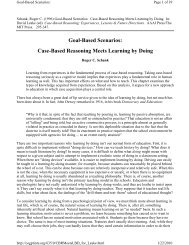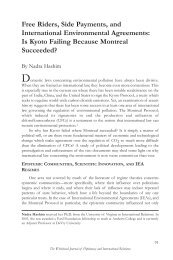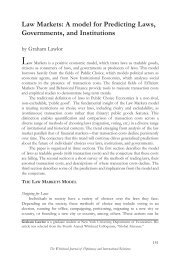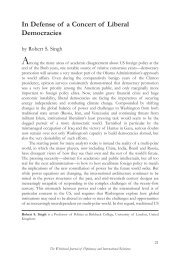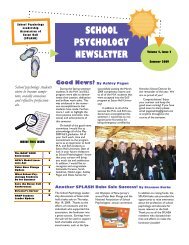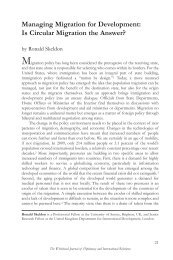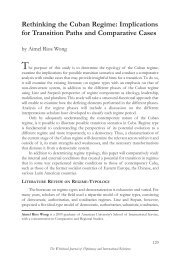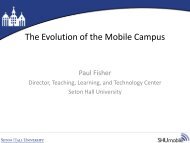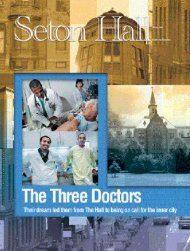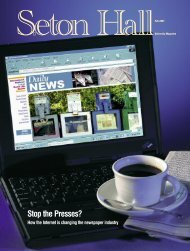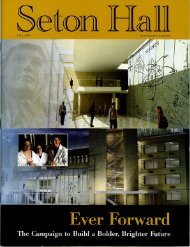Seton Hall Magazine, Winter 2000 - Seton Hall University
Seton Hall Magazine, Winter 2000 - Seton Hall University
Seton Hall Magazine, Winter 2000 - Seton Hall University
Create successful ePaper yourself
Turn your PDF publications into a flip-book with our unique Google optimized e-Paper software.
T h e C a t h o l i c C h u r c h<br />
In 1879, the English writer and orator,<br />
John Henry Newman, made a<br />
remarkably prescient remark about<br />
the coming 20th century. A convert to<br />
Catholicism, Newman — over the objections<br />
of some who considered him “too<br />
liberal” — had been named a Cardinal<br />
of the Catholic Church by Pope Leo<br />
XIII. In his speech accepting the red hat<br />
in Rome, Newman predicted that the<br />
coming century would be an ominous<br />
period for the Church. In particular, he<br />
put his finger on the issue of “truth.” He<br />
singled out the 19th century’s tendency<br />
to invoke particular truths — the truths<br />
of science and of humanistic good will<br />
— as ways of denying any greater truths,<br />
particularly the truths of religion.<br />
And … it must be borne in mind that there is<br />
much in the liberalistic theory which is good<br />
and true; for example, not to say more, the<br />
precepts of justice, truthfulness, sobriety,<br />
self-command, benevolence, which … are<br />
among its avowed principles, and the natural<br />
laws of society. It is not till we find that this<br />
array of principles is intended to supersede,<br />
to block out, religion, that we pronounce it<br />
to be evil. There never was a device of the<br />
Enemy, so cleverly framed, and with such<br />
promise of success.<br />
From this calculated rejection of religious<br />
truth, Newman foresaw dark and<br />
ominous consequences for the 20th<br />
century. His words echo Dostoyevsky’s,<br />
written at about the same time, “If there<br />
is no God, everything is permitted.”<br />
Without truth, without attention to<br />
the inner voice summoning us to what<br />
is right, no matter the cost, then anarchy<br />
reigns, “the center falls apart”<br />
and violence is unleashed on the land.<br />
The 20th century bore grim witness to<br />
millions dead because of false promises.<br />
Nationalistic feelings easily linked<br />
up with the false promises of scientism,<br />
laissez-faire capitalism, fascism<br />
and Marxism. We are still nursing<br />
those wounds.<br />
30 SETON HALL UNIVERSITY MAGAZINE<br />
From Perilous Times, Words of Comfort<br />
BY MONSIGNOR RICHARD M. LIDDY ’60, S.T.L., PH.D.<br />
“Without truth,<br />
without attention<br />
to the inner voice<br />
summoning us to<br />
what is right, no<br />
matter the cost,<br />
then anarchy reigns,<br />
‘the center falls<br />
apart’ and violence<br />
is unleashed on<br />
the land.”<br />
Of course, at the end of the 20th century,<br />
the history of such ideologies made<br />
people wary of any “truth” at all. For<br />
many, truth — even the search for truth<br />
— has ceased to be an existential category<br />
in their lives. Some, still captured by<br />
the enlightenment ideology of scientism,<br />
reduce all of human consciousness to<br />
neuro-biology and lower levels of reality.<br />
For others in this “post-modern” world,<br />
there are only incommensurate worlds<br />
among which we choose for merely<br />
short-term pragmatic reasons. There is<br />
nothing worth caring about, nothing<br />
truly worthy of extravagant love.<br />
When Beavis and Butthead become<br />
the icons of a culture, we are all in<br />
trouble.<br />
It is chiefly for these reasons that the<br />
Catholic Church will certainly continue<br />
to struggle during the third millennium<br />
— as she has throughout her history.<br />
Certainly she will struggle because of<br />
her own sins and her own arrogance. But<br />
she will also suffer from the tremendous<br />
cultural forces arrayed against her mission<br />
of witnessing to her Lord who<br />
called himself “the truth.” In the third<br />
millennium, as in the previous two, she<br />
will certainly be counter-cultural.<br />
Nevertheless, Catholics believe<br />
that, because of the abiding promise<br />
of their Lord to “be with them until<br />
the end of time,” Catholicism will be<br />
a presence in the new millennium. In<br />
1925, G. K. Chesterton indicated what<br />
kind of presence by telling the story<br />
of his own conversion.<br />
I had been blundering about since my birth<br />
with two huge and unmanageable machines<br />
of different shapes and without apparent<br />
connection — the world and the Christian<br />
tradition. I had found this hole in the world:<br />
the fact that one must somehow find a way<br />
of loving the world without trusting it …<br />
I found this projecting feature of Christian<br />
theology, like a sort of hard spike, the dogmatic<br />
insistence that God was personal, and<br />
had made a world separate from himself.<br />
The spike of dogma fitted exactly into the<br />
hole in the world — it had evidently been<br />
meant to go there — and then the strange<br />
things began to happen. When once these<br />
two parts of the two machines had come<br />
together, one after another, all the other parts<br />
fitted and fell in with an eerie exactitude.<br />
I could hear bolt after bolt over all the<br />
machinery falling into its place with a kind of<br />
click of relief .… Instinct after instinct was<br />
answered by doctrine after doctrine.<br />
And as Newman, peering forward<br />
toward an ominous 20th century, still<br />
had confidence in the Catholic community,<br />
so Catholics on the verge of the<br />
new millennium can take comfort from<br />
his words in 1879.<br />
Such is the state of things … and it is well<br />
that it should be realized by all of us; but it<br />
must not be supposed for a moment that<br />
I am afraid of it. I lament it deeply, because<br />
I foresee that it may be the ruin of many<br />
souls; but I have no fear at all that it really can<br />
do aught of serious harm to the Word of God,<br />
to Holy Church, to our Almighty King, the Lion<br />
of the tribe of Judah, Faithful and True, or to His<br />
Vicar on earth. Christianity has been too often in<br />
what seemed deadly peril that we should fear<br />
for it any new trial now.<br />
Monsignor Richard M. Liddy<br />
’60, S.T.L., Ph.D., is the<br />
<strong>University</strong> Professor of Catholic<br />
Thought and Culture.




